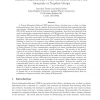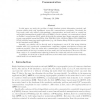23 search results - page 2 / 5 » Private Information Retrieval Based on the Subgroup Membersh... |
132
Voted
ISW
2010
Springer
14 years 11 months ago
2010
Springer
A Private Information Retrieval (PIR) protocol allows a database user, or client, to obtain information from a data- base in a manner that prevents the database from knowing which...
108
Voted
ACISP
2004
Springer
15 years 6 months ago
2004
Springer
In this paper, we study the problem of single database private information retrieval, and present schemes with only logarithmic server-side communication complexity. Previously th...
106
click to vote
FC
2005
Springer
15 years 6 months ago
2005
Springer
Two parties, say Alice and Bob, possess two sets of elements that belong to a universe of possible values and wish to test whether these sets are disjoint or not. In this paper we ...
140
click to vote
CRYPTO
2008
Springer
15 years 2 months ago
2008
Springer
In cryptography, there has been tremendous success in building various two-party protocols with small communication complexity out of homomorphic semantically-secure encryption sc...
150
Voted
PAMI
2008
15 years 14 days ago
2008
A common way to model multiclass classification problems is by means of Error-Correcting Output Codes (ECOCs). Given a multiclass problem, the ECOC technique designs a code word fo...


